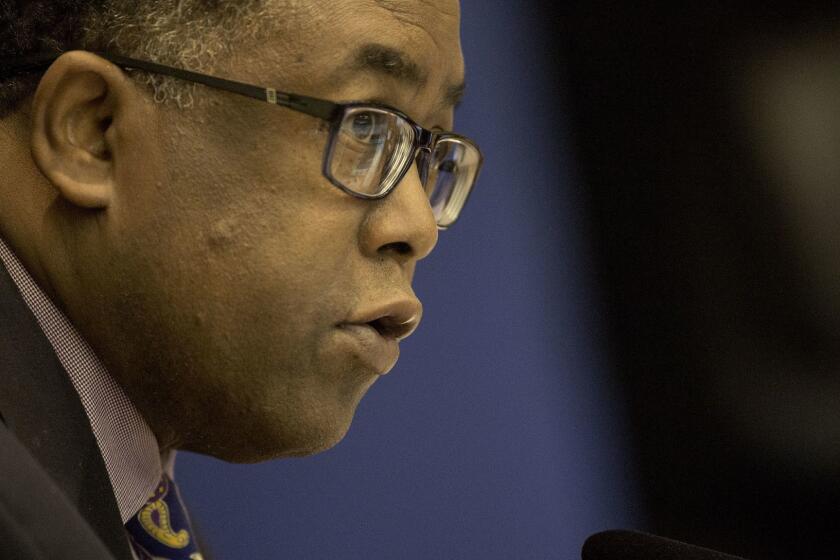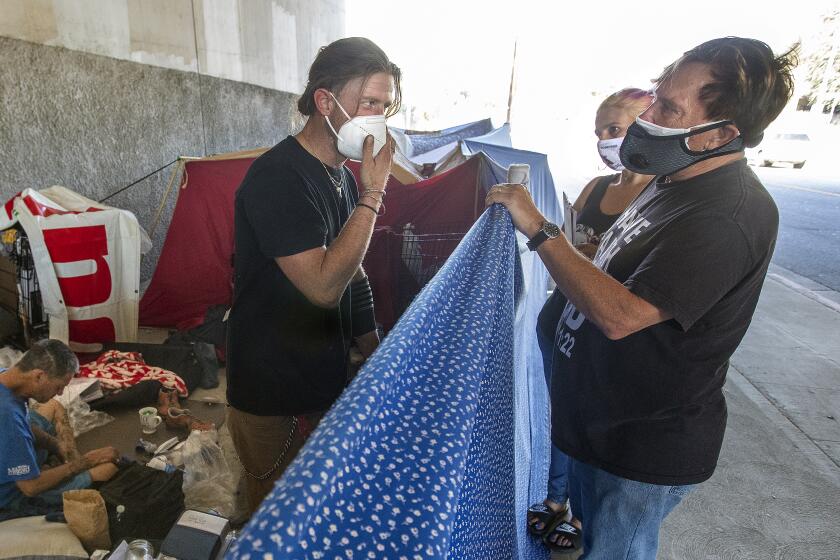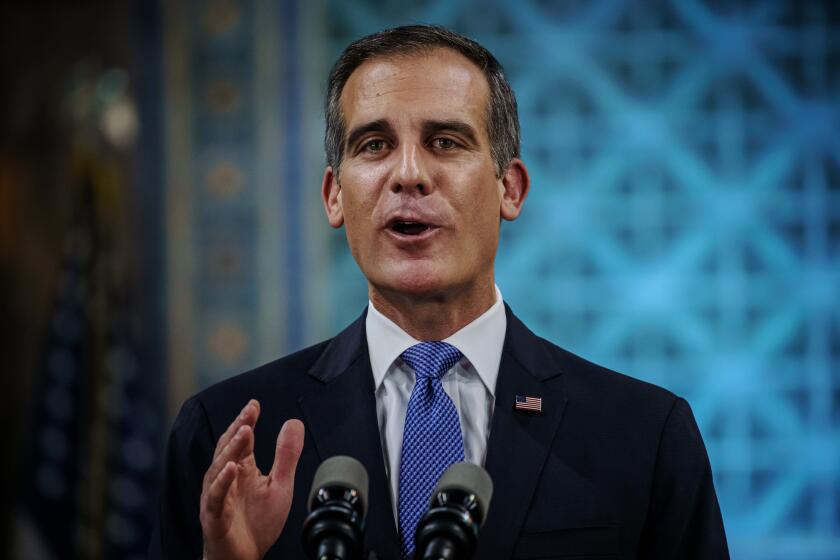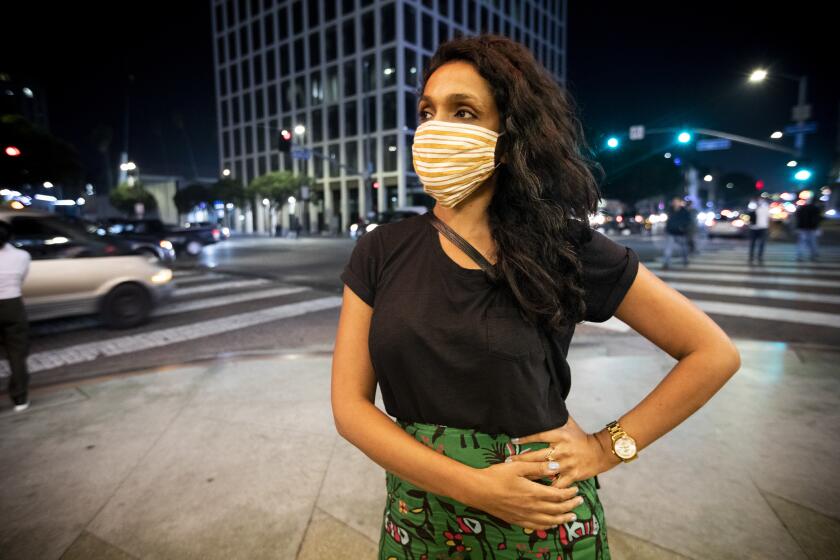A newly constituted City Council could change L.A.’s approach to homelessness
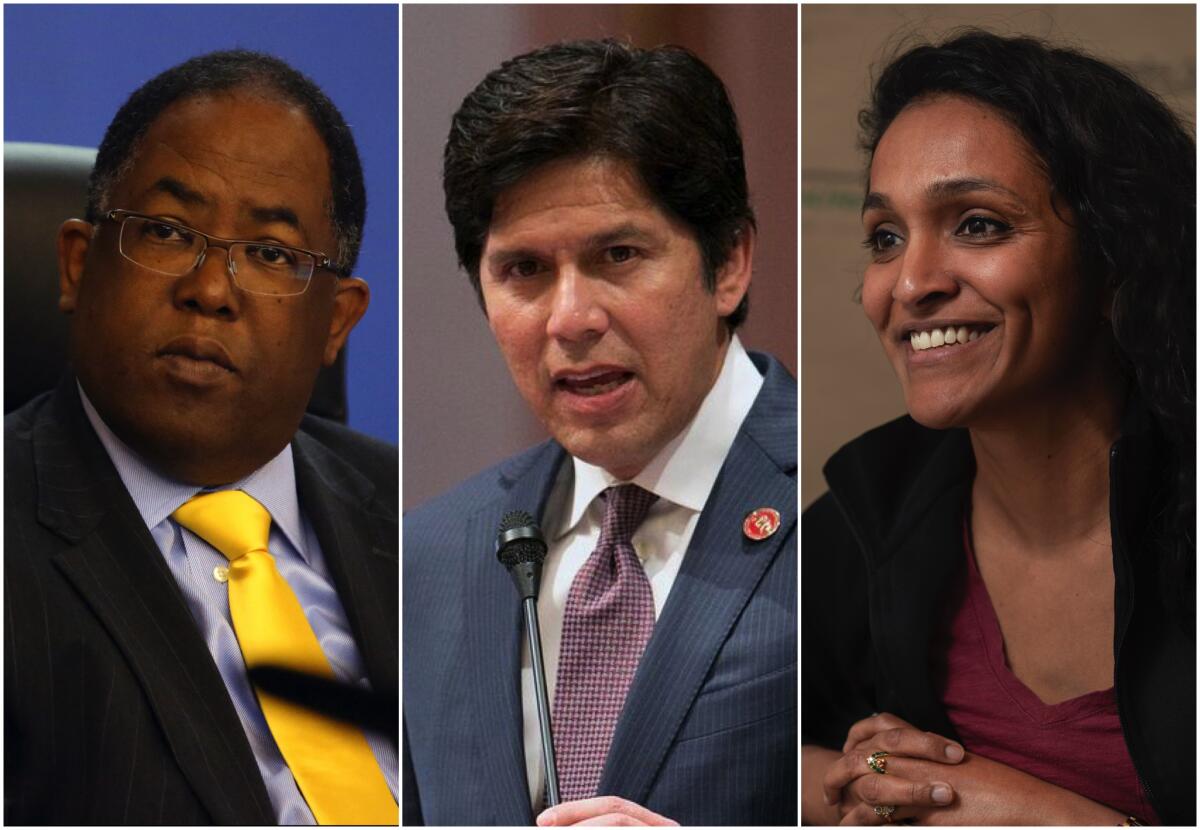
- Share via
For years, homelessness has loomed over the civic culture of Los Angeles as its most intractable problem, one that defined the city and its government in the eyes of many people. Now change may be in the air, with the election of three new members to the City Council, relentless pressure from a federal judge and the potential for a new administration in Washington.
The council’s three newest members rode a wave of discontent over the government’s failure to help the 40,000 Angelenos who have no home amid a pandemic. For some voters, it came down to the city’s inability to keep streets clean and rights-of-way clear. For others, it was about the plight of the most vulnerable citizens — and how the city has essentially criminalized their existence.
Councilman-elect Mark Ridley-Thomas returns to the council after decades of helping to shape homeless policy at the local and state level, including helping pass Measure H, which raised a quarter-cent sales tax to generate about $355 million a year for homeless programs. Another incoming councilman, Kevin de León, comes from a stint as state Senate president pro tempore, helping to oversee state aid for the homeless.
After a county auditor’s critical review of the fiscal management of the Los Angeles Homeless Services Authority, L.A.
The third new member, Nithya Raman, who defeated Councilman David Ryu, comes from working in city government and helping found the SELAH Neighborhood Homeless Coalition in Silver Lake.
They all agree that responding to homelessness is the council’s most important priority and may bring a fresh perspective to a body that’s contending with an ominous budget deficit and the incursion of federal judicial oversight.
“All of them are feeling the intense pressure of having thousands of people sleeping on the streets,” said Tommy Newman, a senior director at United Way of Greater Los Angeles.
Newman said he expected for there to be a continued — and perhaps increased — focus on creating a larger supply of interim housing, as opposed to more permanent supportive housing. These efforts are the quickest way to achieve visible progress, he said, and make it appear that homelessness has abated, even if people in temporary housing, such as shelters, are technically still homeless.
“The city and county remind me of two millionaires in McDonald’s fighting over who will pay for a hamburger while a starving homeless person is hanging out in the parking lot.”
— U.S. District Judge David O. Carter
He spotlighted the recent debate over changes to the city’s anti-camping law that would allow authorities to remove homeless camps anywhere in the city if they first offer shelter as an alternative. Newman said that showed how some members of the City Council think now is the time to give law enforcement a cudgel to move people living on the streets. Other members think the debate is premature so long as there’s a woefully inadequate amount of housing and shelter.
That debate during a council hearing last week didn’t result in any changes to the laws, but the council agreed to continue publicly discussing on Nov. 24 how it will amend the anti-camping ordinances.
Hanging over this debate and the potential efforts of the council is the work of U.S. District Judge David O. Carter, who is overseeing a lawsuit filed in March by a group of downtown Los Angeles business owners and residents. They allege that the city and county of Los Angeles have failed to protect the public and provide adequate shelter for those living on the streets.
Carter has been a forceful presence, bypassing Mayor Eric Garcetti in some respects and working directly with council members on plans to reduce homelessness. Newman said this process has empowered council members, and the new members may not agree about how to handle Carter.
He has focused their attention on people camping near freeways but hasn’t issued an order saying these people must move. This incursion into local policy has been marked by confusion over how much power Carter wields over city and county policies.
“The problem is, the discussion is backward,” Carter said during a court hearing in the City Council chambers Thursday. “This court’s never going to allow anything unless the housing is there.”
As a result of the lawsuit, the county agreed to give the city $300 million over the next five years to fund 6,700 interim housing beds for people who are over 65, along with people living near freeways. Carter continues to hold hearings in the council chambers, where members offer updates about how they’re trying to help the homeless people in their districts.
A judge is pushing the city and county of Los Angeles to clear homeless camps near freeways, but vacated an order requiring the clearance.
During a recent hearing, Carter threatened to hold the city and members of the council in contempt of court if they don’t speed up the introduction of solutions including “tiny home” communities and the rehabbing of motels that could house homeless people.
“I’m going to name the members who aren’t complying. You’re already so far behind it’s disgraceful.” Carter said while noting that there needs to be less bickering between the city and county.
“The city and county remind me of two millionaires in McDonald’s fighting over who will pay for a hamburger while a starving homeless person is hanging out in the parking lot.”
The push to make concrete progress on homelessness will unfold in a year when at least half of the city’s 18 elected officials are preparing to run for reelection or other elected offices in 2022.
Los Angeles has already promised to create 6,700 beds for homeless people as part of an agreement reached during a federal lawsuit. That initiative will be covered by county, state and federal funding, city officials said.
Faced with a major budget deficit, L.A. officials won’t be capable of launching new city-funded homeless programs without raiding the funds of other city agencies, such as the police department. They have said that more support from a potential Joe Biden administration would be important to make a dent in the crisis.
L.A.’s financial crisis triggered by the coronavirus has gotten worse, with analysts warning the shortfall could reach $600 million
Seven members of the City Council are expected to seek reelection in 2022, while an eighth — Councilman Paul Koretz — is running for city controller. City Atty. Mike Feuer has launched a campaign for mayor and two other elected officials and several members of the City Council have not ruled out a run.
Ridley-Thomas comes to the council after having already served on it in the 1990s — and has maintained that homelessness remains his top priority. He said that the city, while still working to create more affordable housing, most focus in on helping people who are on the streets as quickly as possible through the construction of more shelters and more novel efforts such as tiny homes.
“Government has to recognize that it has an obligation to lift them up, not to chase them around, not to incarcerate them, but to lift them up and restore them to a place of dignity that they deserve,” Ridley-Thomas said. “We need to increase our focus on interim housing because we can’t get enough affordable housing built quickly.”
Raman was unavailable for comment, but her campaign co-chair, Meghan Choi, said that housing affordability and homelessness were the top priorities for voters.
“I really do think her focus on these issues helped,” Choi said.
Raman’s victory marks the first time in 17 years that a challenger has ousted a sitting Los Angeles City Council member.
Raman, a former city Administrative Office official, laid out a platform that focuses on slowing the rise of rents, reducing the criminalization of homelessness and providing more services for those who are the streets by creating more “community access centers” where homeless residents can go for help.
De León is no different in arguing that the crisis playing out on the streets is the city’s most urgent priority. He’s still developing the specific policy initiatives he’d like to see enacted but said more federal support is essential and that barriers of bureaucracy must be broken down.
“This humanitarian crisis and dystopian nightmare requires all hands on deck,” he said. “Silos must be decimated and all levels of government must coalesce.”
Times staff writer David Zahniser contributed to this report.
More to Read
Sign up for Essential California
The most important California stories and recommendations in your inbox every morning.
You may occasionally receive promotional content from the Los Angeles Times.
